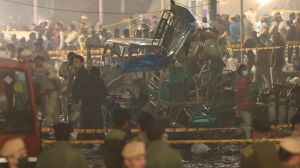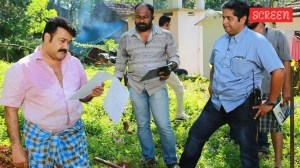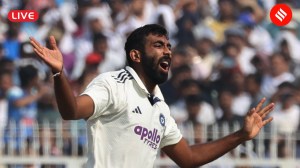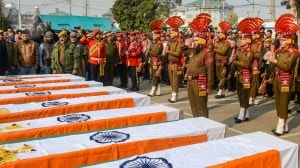Shubhajit Roy, Diplomatic Editor at The Indian Express, has been a journalist for more than 25 years now. Roy joined The Indian Express in October 2003 and has been reporting on foreign affairs for more than 17 years now. Based in Delhi, he has also led the National government and political bureau at The Indian Express in Delhi — a team of reporters who cover the national government and politics for the newspaper. He has got the Ramnath Goenka Journalism award for Excellence in Journalism ‘2016. He got this award for his coverage of the Holey Bakery attack in Dhaka and its aftermath. He also got the IIMCAA Award for the Journalist of the Year, 2022, (Jury’s special mention) for his coverage of the fall of Kabul in August 2021 — he was one of the few Indian journalists in Kabul and the only mainstream newspaper to have covered the Taliban’s capture of power in mid-August, 2021. ... Read More
Maldives elections on September 30: Why India is watching closely
Maldives's location in the Indian Ocean makes it strategically important to India. As President Solih, seen as friendly to India, faces a tough re-election and the Opposition fuels the 'India-Out' campaign, here's all you need to know.
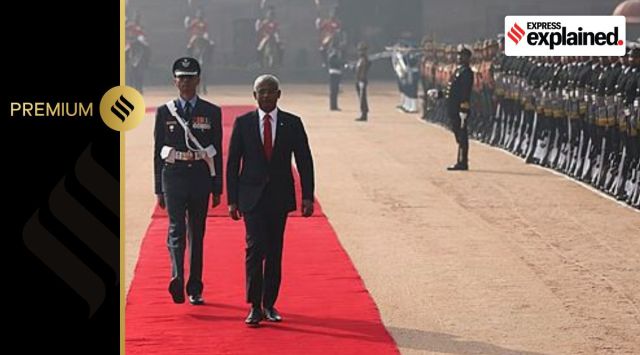 Maldives President Ibrahim Mohamed Solih at Rashtrapati Bhavan in 2022. (Express photo by Tashi Tobgyal)
Maldives President Ibrahim Mohamed Solih at Rashtrapati Bhavan in 2022. (Express photo by Tashi Tobgyal)
Maldives goes to runoff polls this Saturday, after no candidate secured more than 50% of the votes in the first round on September 9.
Maldives’ electoral system is similar to France, where the winner has to secure more than 50% of votes. If no one crosses the mark in the first round, in the second round, the top two candidates go head to head.
In the first round of polling, Maldives President Ibrahim Mohamed Solih from the Maldivian Democratic Party (MDP) got 39% of the votes, while the Opposition alliance candidate Mohamed Muizzu got 46%.
The first round was also a crowded battlefield, with eight candidates — the highest so far.
For perspective, Maldives has a population of about 5.2 lakh people. According to the Election Commission of Maldives, 2.8 lakh are eligible voters, of which about 1.6 lakh are members of various political parties.
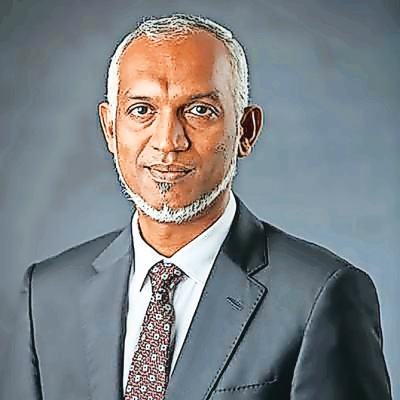 Muizzu, the challenger. (X/@MMuizzu)
Muizzu, the challenger. (X/@MMuizzu)History
Maldives has followed a system of Executive Presidency since 1968. It followed a single-party system till 2008, and the President was elected for five years through a referendum.
The first executive President of the Maldives, Ibrahim Naseer, was in power from 1968 to 1978. With political protests erupting in 1978, Naseer did not contest for the third term and the Maldives’ parliament chose Maumoon Abdul Gayoom — the then Transport minister — as the next President.
Gayoom ruled the country for 30 years, till 2008, quelling protests and famously defeating a coup attempt with India’s help in 1988.
However, amid protests by different groups, Gayoom undertook political reforms in 2004. Political parties were registered in 2005 and a new Constitution adopted in 2008. That charted the path towards Presidential elections every five years with a multi-party system.
Since 2008, no incumbent President has been re-elected. In the last elections in 2018, Ibrahim Mohamed Solih defeated incumbent Abdulla Yameen, Gayoom’s half brother.
Maldives’ Presidents and India
India’s experience with Maldives politics has been a mixed bag, with Solih’s government being the most favourable so far.
India worked with Abdul Gayoom closely for three decades. When Mohamed Nasheed came to power in 2008, then Vice President Hamid Ansari attended his oath-taking ceremony, signalling New Delhi’s support.
While initially there was bonhomie between India and Nasheed, he soon began courting China. The Maldives government cancelled the GMR contract for the Maldives airport in 2012, a major setback to the ties.
After Yameen came to power in 2013, he courted China much more aggressively. Under him, Maldives joined President Xi Jinping’s Belt and Road Initiative.
When India and Western lenders were not willing to offer loans to Yameen’s administration due to allegations of human rights violations, he turned to Beijing, which offered the money without any conditions.
So, when Solih won the 2018 elections, Delhi heaved a sigh of relief. Prime Minister Narendra Modi went to Maldives to attend the swearing-in ceremony.
Over the past five years, the relationship has strengthened, and India has reached out to Maldives on various occasions — from providing vaccines to building infrastructure to helping with debt relief assistance.
Aid, trade, and pushback
According to Indian officials, India’s swift dispatch of 30,000 doses of measles vaccine in January 2020, and the rapid and comprehensive assistance during the Covid pandemic, has reinforced India’s credentials of being Maldives’ “first responder”.
In the past, India was the first to assist Maldives during the 2004 tsunami as well as the water crisis in Malé in Dec 2014.
India’s recent projects in Maldives include water and sanitation in 34 islands, roads and land reclamation under the Addu development project, a cancer hospital, a port project, a cricket stadium, two airport development projects, the Greater Male connectivity project with bridges, causeways and roads, social housing projects, renovation of a mosque, building the national college for police, among others.
Estimates suggest that between 2018 to 2022, Indian aid was over Rs 1,100 crore, more than double the previous five year-term (about Rs 500 crore).
Trade between the two countries was about Rs 50 crore last year, of which India exported commodities worth Rs 49.5 crore — from daily essentials including rice, spices, fruits, vegetables and poultry produce to medicines and cement. India imports primarily scrap metals, and is exploring seafood products.
Maldives’ proximity to the west coast of India and its position at the hub of commercial sea-lanes running through the Indian Ocean imbues it with strategic importance for India.
As a consequence, the defence ties between India and Maldives have grown, especially since the 26/11 attacks, for coastal surveillance and maritime cooperation. India has trained over 1,500 Maldivian defence and security personnel in the last 10 years, meeting around 70% of their defence training requirements.
India has also gifted two helicopters in 2010 and 2013 and one small aircraft in 2020. This has led to claims of Indian military personnel being stationed in Maldives to operate and maintain the aircraft, though Delhi has said the planes are for search and rescue missions and medical evacuations.
“While India’s role as a development partner has been appreciated by many, a large section of Maldivians, particularly the youth, are getting attracted to the ‘India Out’ movement propagated by the [Opposition] Progressive Alliance. As a result, India is an agenda in this year’s election campaign,” Gulbin Sultana, Associate Fellow at the Manohar Parrikar Institute for Defence Studies and Analyses, wrote in a piece earlier this month on the IDSA website.
How this election stands
The current political landscape has Solih facing a challenger in the Progressive Alliance’s candidate Mohammed Muizzu. Muizzu, who was the Mayor of Male, emerged as a consensus candidate of the coalition after former president Abdulla Yameen was barred from contesting elections following his conviction in a money laundering case.
But Solih’s other challenge has been desertions from the ruling alliance — most prominently of former president Nasheed, who fell out with Solih.
Muizzu is being seen as a proxy of Yameen. And his statements have given India plenty of reasons to worry. He has threatened to terminate agreements with foreign countries and expel foreign companies if they are not beneficial to Maldives and its people — all thinly-veiled references to India.
He has said the withdrawal of Indian troops from Maldives will begin from the first day of his government, through the “beautiful principles of diplomacy”.
He has hailed Yameen for the Chinese-funded projects. “President Yameen’s government maintained very close relations with China. That is in the best interest of this country. That country did not cross our boundaries. They did not meddle with our freedom,” Muizzu has said.
Solih, though he won praise for his handling of Covid-19, is battling anti-incumbency. His campaign has focussed on the achievements of his government.
One of the concerns about this election in Maldives has been the low turnout — 79% in the first round, “the least since its democratic transition in 2008, when previous elections in 2008, 2013, and 2018 had a turnout of 86%, 87%, and 89 % respectively,” Aditya Gowdara Shivamurthy, Associate Fellow with ORF’s Strategic Studies Programme, said.
New Delhi, thus, will be watching the polls with keen interest as Solih trails in the first round.
Much will depend on whom the smaller parties support, including Nasheed’s The Democrats. Interestingly, in the first round, Nasheed’s party got 7% — the gap between Solih and Muizzu was seven points.



- 01
- 02
- 03
- 04
- 05













